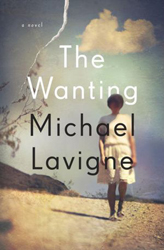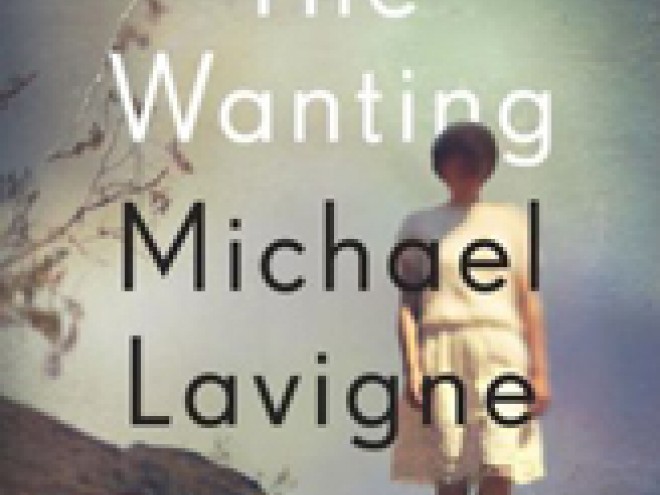This week, Michael Lavigne, the author of The Wanting and the Sami Rohr Prize Choice Award novel Not Me, blogs for The Postscript on the difficulty of editing and what he lost along the way. The Postscript series is a special peek “behind the scenes” of a book. It’s a juicy little extra something to add to a book club’s discussion and a reader’s understanding of how the book came together.
To “host” Michael at your next book club meeting, request him through JBC Live Chat.

Dear Book Clubs!
One of the hardest things about writing a novel is how much you lose – in pages, that is. In the case of The Wanting, well over two hundred went by the wayside. Some things had to go because they slowed the reader too much, others because they took journeys through time that got overly complex, and others because the book simply refused to go in that direction.For instance, at one point, Roman’s desert odyssey took him to an abandoned village where he experienced a religious epiphany in a sand quarry – a 20 page adventure that ended up as four sentences in the finished work: I sang to the bright sky as to a child, as I used to do to Anyusha, every night in fact; long after she had fallen asleep, I would steal into her room, lean over her bed, place my lips beside her ear, and — not sing, because I can’t sing – but whisper my incantation, Papa will always take care of you. Papa is your best friend. Papa will never leave you. Anyusha will never be alone again. A version, by the way, of something I used to say to my own son, Sam. Other losses: The tale of beating up Dima Chernapolsk once ran many pages and involved Roman’s friend Fima, who also was a far more developed character. Collette’s history was at one time fleshed out by at least thirty more pages – actually in a very early draft, more than one hundred additional pages were dedicated to her, including an elaborate description of her grandfather’s life and his house in Paris and the entire story of her father’s tribulations in the days just before and after her birth. But the lost words I regret most were to be found in a fairytale, now condensed to a single paragraph and utterly changed, that I invented for Roman’s drunken dream when he fell asleep watching Good Night Children (a real show, by the way, that three-year-old Sam loved during our Moscow stay).
My fairytale was called The Story of Prince Oleg And Young Ekim Efiv, and it ran nine pages before Roman was awakened mid-dream by his very annoyed mother. I even sketched the conclusion of the story which I intended to introduce later in the book. When we were living in the Soviet Union, I read dozens of these tales to Sam or saw animated versions of them on television, so it didn’t take much for me to jump into the role of Russian storyteller. In my draft, the evil witch Baba Yaga grants a barren queen two children, on the promise she will give one of them up to the witch. When the day of reckoning comes, the queen hides one of her sons in the forest, trying to fool the witch into believing she gave birth to but a single child – but the furious witch steals that one anyway. When the queen goes to find her hidden baby, it too is gone,  leaving her childless. Unknown to her, the boy was found and nurtured by an old peasant woman and her husband. They name him Efim Efiv and he grows strong and happy in their village home. Eventually, though, he must leave this little paradise and find his way in the world – to confront the witch and his lost brother (Prince Oleg, now a wicked sorcerer), save (and lose) (and save) the woman of his dreams with the help of an enchanted bear, carp, and falcon, all tropes in Russian fairy tales, and finally reclaim his rightful place as prince – which he never quite does since the tale was constructed as a reflection of Roman’s unconscious and his true feelings about Collette.
leaving her childless. Unknown to her, the boy was found and nurtured by an old peasant woman and her husband. They name him Efim Efiv and he grows strong and happy in their village home. Eventually, though, he must leave this little paradise and find his way in the world – to confront the witch and his lost brother (Prince Oleg, now a wicked sorcerer), save (and lose) (and save) the woman of his dreams with the help of an enchanted bear, carp, and falcon, all tropes in Russian fairy tales, and finally reclaim his rightful place as prince – which he never quite does since the tale was constructed as a reflection of Roman’s unconscious and his true feelings about Collette.
What a joy this was to write — and so painful to lose. But cutting it was the right thing to do. First drafts are an explosion of story. Real writing, though, is in the editing. So the question is, would any of these lost sections have deepened your understanding of the book, or is it enough that I, the writer, know them as back-story? My knowledge of all this unreported history gives my characters a reality, a grounding, that surely is felt by readers. In writing, as in life, loss deepens in unseen ways our journey toward truth.
To read more from Michael, see his posts for The Visiting Scribe here.


